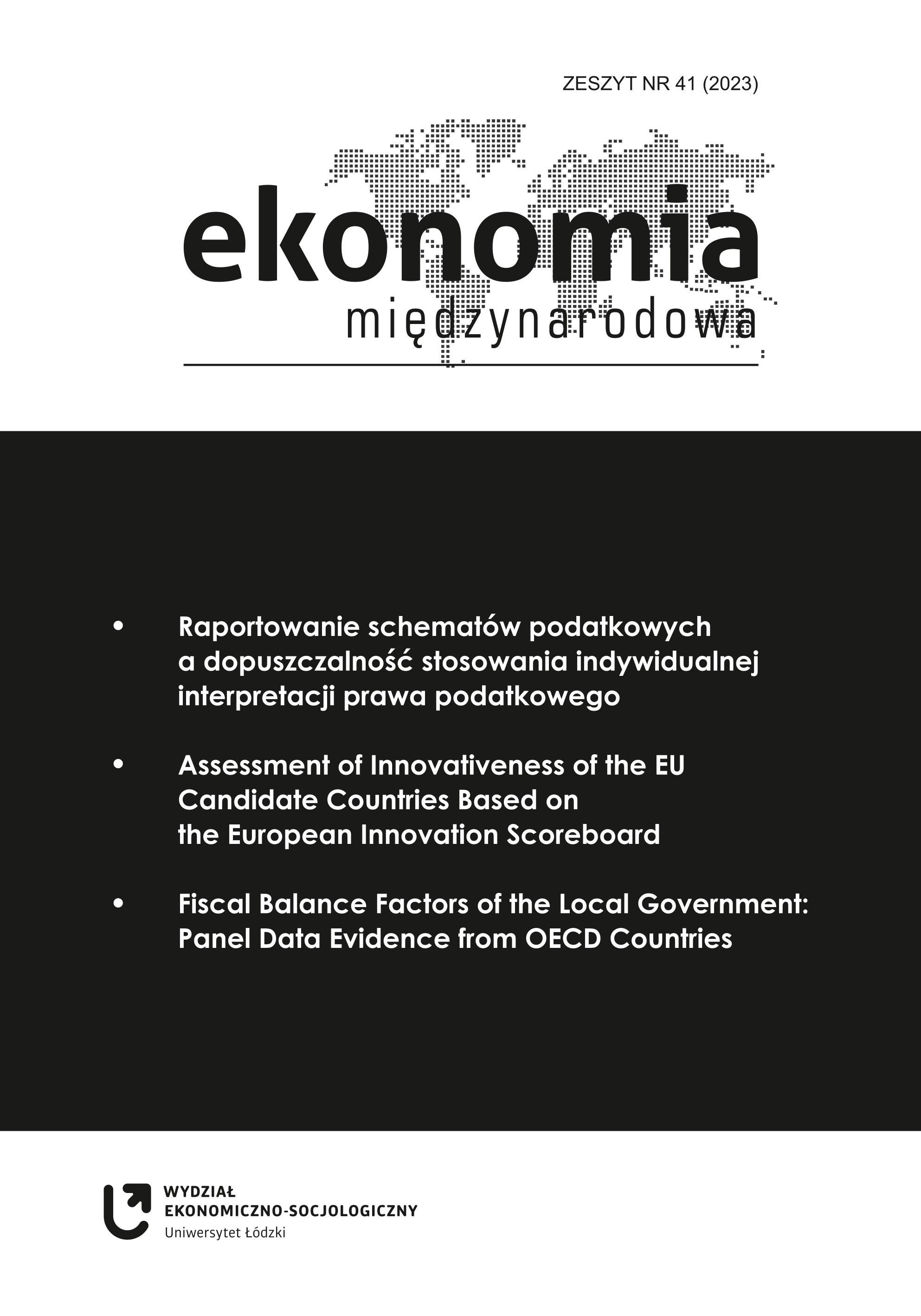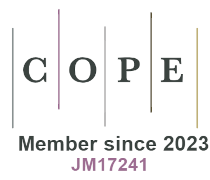Czynniki Równowagi Fiskalnej Samorządu Terytorialnego: badanie danych panelowych dotyczące krajów OECD
DOI:
https://doi.org/10.18778/2082-4440.41.03Słowa kluczowe:
równowaga fiskalna, deficyt, stabilność fiskalna, zagrożenie fiskalne, samorząd terytorialny, wybory samorządowe, korupcjaAbstrakt
Równowaga fiskalna postrzegana jest jako podstawowy miernik stabilności fiskalnej w samorządzie terytorialnym. Wpływa ona na reakcję budżetu na wypadek potencjalnej recesji, determinując zagrożenie fiskalne i odporność finansową. Stąd ekonomiści prowadzą badania w celu identyfikacji czynników oddziałujących na równowagę fiskalną na szczeblu lokalnym. Dlatego celem tego artykuły jest zbadanie czynników o charakterze fiskalnym, społeczno-ekonomicznym, politycznym i instytucjonalnym, które wpływają na poziom salda budżetowego w relacji do Produktu Krajowego Brutto (PKB) na podstawie krajów OECD w latach 2007–2021. W badaniu zastosowano modele panelowe z efektami stałymi oraz z efektami losowymi, dynamiczne modele panelowe (GMM) oraz kwantylową regresję panelową z efektami stałymi. W rezultacie potwierdzono, że na poziom salda budżetowego samorządu terytorialnego w relacji do PKB oddziałuje strona wydatkowa decentralizacji fiskalnej, aktywność inwestycyjna, zmiany wskaźnika zadłużenia, inflacja, zmiana stopy bezrobocia, Wskaźnik Rozwoju Społecznego, wymiana handlowa, wzrost PKB oraz wybory samorządowe. Ujawniono także statystyczną istotność wpływu korupcji w przypadku oszacowanych modeli kwantylowej regresji panelowej z efektami stałymi. Dodatkowo zastosowano testy statystyczne U Manna–Whitney’a, Kruskala–Wallisa oraz Dunna w celu zidentyfikowania różnic pomiędzy krajami Europy Środkowo-Wschodniej i pozostałymi państwami OECD pod względem rozkładu badanego salda budżetowego w PKB.
Bibliografia
Aidt T.S. (2009), Corruption, institutions, and economic development, “Oxford Review of Economic Policy”, 25(2): 271–291. https://doi.org/10.1093/oxrep/grp012
Google Scholar
DOI: https://doi.org/10.1093/oxrep/grp012
Apergis N., Ben Ali, M.S. (2020), Corruption, Rentier States and Economic Growth Where Do the GCC Countries Stand?, [in:] H. Miniaoui (ed.), Economic Development in the Gulf Cooperation Council Countries. Gulf Studies, Vol. 1. Springer, Singapore. https://doi.org/10.1007/978-981-15-6058-3_6
Google Scholar
DOI: https://doi.org/10.1007/978-981-15-6058-3_6
Baltagi B.H. (2021), Econometric Analysis of Panel Data, Sixth Edition, Springer, Cham.
Google Scholar
DOI: https://doi.org/10.1007/978-3-030-53953-5
Barreto H., Howland, F. (2006), Introductory Econometrics: Using Monte Carlo Simulation with Microsoft Excel, Cambridge University Press, New York.
Google Scholar
DOI: https://doi.org/10.1017/CBO9780511809231
Benito B., Guillamón M.-D., Ríos A.-M. (2021), Political Budget Cycles in Public Revenues: Evidence From Fines, “SAGE Open”, 11(4). https://doi.org/10.1177/21582440211059169
Google Scholar
DOI: https://doi.org/10.1177/21582440211059169
Bernheim B.D. (1989), A Neoclassical Perspective on Budget Deficits, “Journal of Economic Perspectives”, 3(2): 55–72. https://doi.org/10.1257/jep.3.2.55
Google Scholar
DOI: https://doi.org/10.1257/jep.3.2.55
Beyaert A., García-Solanes J., Lopez-Gomez L. (2023), Corruption, quality of institutions and growth, “Applied Economic Analysis”, 31(91): 55–72. https://doi.org/10.1108/AEA-11-2021-0297
Google Scholar
DOI: https://doi.org/10.1108/AEA-11-2021-0297
Bonfatti A., Forni L. (2019), Fiscal rules to tame the political budget cycle: Evidence from Italian municipalities, “European Journal of Political Economy”, 60: 1–20. https://doi.org/10.1016/j.ejpoleco.2019.06.001
Google Scholar
DOI: https://doi.org/10.1016/j.ejpoleco.2019.06.001
Brown-Collier E.K., Collier B.E. (1995), What Keynes Really Said about Deficit Spending, “Journal of Post Keynesian Economics”, 17(3): 341–355. https://doi.org/10.1080/01603477.1995.11490034
Google Scholar
DOI: https://doi.org/10.1080/01603477.1995.11490034
Bukowska G., Siwińska-Gorzelak J. (2016), Can Fiscal Decentralisation Curb Fiscal Imbalances?, University of Warsaw, Faculty of Economic Science, “Working Papers”, 35(226).
Google Scholar
Cifuentes-Faura J., Simionescu M., Gavurova B. (2022), Determinants of local government deficit: evidence from Spanish municipalities, “Heliyon”, 8(12): 1–11. https://doi.org/10.1016/j.heliyon.2022.e12393
Google Scholar
DOI: https://doi.org/10.1016/j.heliyon.2022.e12393
Combes J.-L., Saadi-Sedik T. (2006), How Does Trade Openness Influence Budget Deficits in Developing Countries?, “IMF Working Paper”, 3.
Google Scholar
DOI: https://doi.org/10.2139/ssrn.888148
Crivelli E. (2012), Local Governments’ Fiscal Balance, Privatization, and Banking Sector Reform in Transition Countries, “IMF Working Paper”, 146.
Google Scholar
DOI: https://doi.org/10.2139/ssrn.2127038
Das P. (2019), Econometrics in Theory and Practice. Analysis of Cross Section, Time Series and Panel Data with Stata 15.1, Singapore, Springer.
Google Scholar
DOI: https://doi.org/10.1007/978-981-32-9019-8
Dreher A., Schneider F. (2010), Corruption and the shadow economy: an empirical analysis, “Public Choice”, 144: 215–238. https://doi.org/10.1007/s11127-009-9513-0
Google Scholar
DOI: https://doi.org/10.1007/s11127-009-9513-0
Drissen G.A. (2022), Deficits, Debt, and the Economy: An Introduction, Deficits. Updated December 20, “Congressional Research Service”, R44383.
Google Scholar
Działo J., Guziejewska B., Majdzińska A., Żółtaszek A. (2019), Determinants of Local Government Deficit and Debt: Evidence from Polish Municipalities, “Lex Localis – Journal of Local Self-Government”, 17(4): 1033–1056. https://doi.org/10.4335/17.4.1033-1056(2019)
Google Scholar
Filipiak B.Z., Wyszkowska D. (2022), Stabilność fiskalna w krajach UE, “Wiadomości Statystyczne. The Polish Statistician”, 67(8): 17–40. https://doi.org/10.5604/01.3001.0015.9703
Google Scholar
DOI: https://doi.org/10.5604/01.3001.0015.9703
Fischer S., Easterly W. (1990), The Economics of the Government Budget Constraint, “The World Bank Research Observer”, 5(2): 127–142. https://doi.org/10.1093/wbro/5.2.127
Google Scholar
DOI: https://doi.org/10.1093/wbro/5.2.127
Galiński P. (2021), Zagrożenie fiskalne jednostek samorządu terytorialnego. Uwarunkowania, pomiar, ograniczanie, Wydawnictwo Uniwersytetu Gdańskiego, Gdańsk–Sopot.
Google Scholar
Galiński P. (2022), Importance of the Size of Local Government in Avoiding the Fiscal Distress – Empirical Evidence on Communes in Poland, “Annales Universitatis Mariae Curie-Skłodowska, sectio H – Oeconomia”, 56(5): 101–113. https://doi.org/10.17951/h.2022.56.5.101-113
Google Scholar
DOI: https://doi.org/10.17951/h.2022.56.5.101-113
Galiński, P. (2023a), Key Debt Drivers of Local Governments: Empirical Evidence on Municipalities in Poland, Lex Localis – Journal of Local Self-Government, 21(3): 591–618. https://doi.org/10.4335/21.3.591-618(2023)
Google Scholar
DOI: https://doi.org/10.4335/21.3.591-618(2023)
Galinski P. (2023b), Determinants of debt for local governments in Europe – panel data research, “Forum Scientiae Oeconomia”, 11(2): 69–86. https://doi.org/10.23762/FSO_VOL11_NO2_3
Google Scholar
Gnimassoun B., Do Santos I. (2021), Robust structural determinants of public deficits in developing countries, “Applied Economics”, 53(9): 1052–1076. https://doi.org/10.1080/00036846.2020.1824063
Google Scholar
DOI: https://doi.org/10.1080/00036846.2020.1824063
Gruszczyński M. (2020), Financial Microeconometrics. A Research Methodology in Corporate Finance and Accounting, Springer, Cham.
Google Scholar
DOI: https://doi.org/10.1007/978-3-030-34219-7
Hemming R., Mahfouz S., Schimmelpfennig A. (2002), Fiscal Policy and Economic Activity During Recessions in Advanced Economies, “IMF Working Paper”, 87.
Google Scholar
DOI: https://doi.org/10.2139/ssrn.879624
Hill R.C., Griffiths W.E., Lim, G.C. (2018), Principles of Econometrics, Fifth Edition, John Wiley & Sons, Hoboken.
Google Scholar
Jacquemet N., L’Haridon O. (2018), Experimental Economics. Methods and Applications, Cambridge University Press, Cambridge.
Google Scholar
DOI: https://doi.org/10.1017/9781107446786
Kacapyr E. (2022), Essential Econometric Techniques A Guide to Concepts and Applications, Third Edition, Routledge, New York.
Google Scholar
DOI: https://doi.org/10.4324/9781003213758
Kłysik-Uryszek A., Uryszek T. (2022), Public Debt Sustainability and the COVID Pandemic: The Case of Poland, “Central European Economic Journal”, 9(56): 68–75. https://doi.org/10.2478/ceej-2022-0005
Google Scholar
DOI: https://doi.org/10.2478/ceej-2022-0005
Koengkan M., Fuinhas J.A., Tavares A.I.P, Silva N.M.B.G. (2023), Obesity Epidemic and the Environment Latin America and the Caribbean Region, Elsevier, London.
Google Scholar
DOI: https://doi.org/10.1016/B978-0-323-99339-5.00001-7
Köppl Turyna M., Kula G., Balmas A., Waclawska K. (2016), The effects of fiscal decentralisation on the strength of political budget cycles in local expenditure, “Local Government Studies”, 42(5): 785–820. https://doi.org/10.1080/03003930.2016.1181620
Google Scholar
DOI: https://doi.org/10.1080/03003930.2016.1181620
Lami E. (2023), Political Budget Cycles in the Context of a Transition Economy: The Case of Albania, “Comparative Economic Studies”, 65: 221–262. https://doi.org/10.1057/s41294-022-00191-6
Google Scholar
DOI: https://doi.org/10.1057/s41294-022-00191-6
Lis E.M, Nickel C. (2010), The impact of extreme weather events on budget balances, “International Tax and Public Finance”, 17(4): 378–399. http://hdl.handle.net/10.1007/s10797-010-9144-x
Google Scholar
DOI: https://doi.org/10.1007/s10797-010-9144-x
Machado J.A.F., Santos Silva J.M.C. (2019), Quantiles via Moments, “Journal of Econometrics”, 213(1): 145–173. https://doi.org/10.1016/j.jeconom.2019.04.009
Google Scholar
DOI: https://doi.org/10.1016/j.jeconom.2019.04.009
Mawejje J., Odhiambo N.M. (2022), Macroeconomic determinants of fiscal policy in East Africa: a panel causality analysis, “Journal of Economics, Finance and Administrative Science”, 27(53): 105–123. https://doi.org/10.1108/JEFAS-07-2021-0124
Google Scholar
DOI: https://doi.org/10.1108/JEFAS-07-2021-0124
Muluk M.R.K., Wahyudi L.E. (2022), Key Success in Fostering Human Development Index at the Local Level, “Otoritas: Jurnal Ilmu Pemerintahan”, 12(2): 128–141. https://doi.org/10.26618/ojip.v12i2.7665
Google Scholar
DOI: https://doi.org/10.26618/ojip.v12i2.7665
National Research Council (NTC) and National Academy of Public Administration (NAPA), (2010), Choosing the Nation’s Fiscal Future, The National Academies Press, Washington, DC.
Google Scholar
OECD (2021), Government at a Glance 2021, OECD Publishing, Paris. https://doi.org/10.1787/1c258f55-en
Google Scholar
DOI: https://doi.org/10.1787/1c258f55-en
Organisation for Economic Co-operation and Development (OECD), https://stats.oecd.org/ (accessed: 16.05.2023)
Google Scholar
Organisation for Economic Co-operation and Development (OECD), https://www.oecd.org/tax/federalism/fiscal-decentralisation-database/ (accessed: 16.05.2023)
Google Scholar
Pinardon-Touati N. (2022), The Crowding Out Effect of Local Government Debt: Micro and Macro-Estimates, “Working Paper”, HEC Paris.
Google Scholar
Postiglione P. (2022), Spatial Panel Regression Models in R, [in:] P. Postiglione, R. Benedetti, F. Piersimoni (eds.), Spatial Econometric Methods in Agricultural Economics Using R, Taylor & Francis Group, Boca Raton.
Google Scholar
DOI: https://doi.org/10.1201/9780429155628
Rangarajan C., Srivastava D.K. (2005), Fiscal Deficits and Government Debt: Implications for Growth and Stabilisation, “Economic and Political Weekly”, 40(27): 2919–2934.
Google Scholar
Shah A. (2005), Fiscal decentralization and fiscal performance, “World Bank Policy Research Working Papers”, 3786.
Google Scholar
DOI: https://doi.org/10.1596/1813-9450-3786
Simionescu M., Cifuentes-Faura J. (2023), Public Debt in the Spanish Municipalities: Drivers and Policy Proposals, “Evaluation Review”, 0(0): 1–32. https://doi.org/10.1177/0193841X231193465
Google Scholar
DOI: https://doi.org/10.1177/0193841X231193465
Sinervo L.-M. (2020), Financial Sustainability of Local Governments in the Eyes of Finnish Local Politicians, “Sustainability”, 12(10207): 1–16. https://doi.org/10.3390/su122310207
Google Scholar
DOI: https://doi.org/10.3390/su122310207
Sonmez Ozekicioglu S., Yaraşır Tülümce S. (2020). The Impacts of Corruption on Budget Balance and Public Debt in Turkey: an Empirical Analysis, “Journal of Management and Economics Research”, 18(3): 46–60. https://doi.org/10.11611/yead.775529
Google Scholar
DOI: https://doi.org/10.11611/yead.775529
Sow M., Razafimahefa I. (2017), Fiscal Decentralization and Fiscal Policy Performance, “IMF Working Paper”, 64.
Google Scholar
DOI: https://doi.org/10.2139/ssrn.2967419
Tanzi V., Davoodi H. (2001), Corruption, growth, and public finances, [in:] A.K. Jain (ed.), The Political Economy of Corruption, Routledge, London–New York.
Google Scholar
DOI: https://doi.org/10.4324/9780203468388.pt3
Teixeira A.A.C., Guimarães L. (2015), Corruption and FDI: Does the Use of Distinct Proxies for Corruption Matter?, “Journal of African Business”, 16(1–2): 159–179. https://doi.org/10.1080/15228916.2015.1027881
Google Scholar
DOI: https://doi.org/10.1080/15228916.2015.1027881
Transparency International (2022), Corruption Perceptions Index 2021, Berlin.
Google Scholar
Transparency International (TI), https://www.transparency.org/en/cpi/ (accessed: 18.05.2023).
Google Scholar
Tujula M., Wolswijk G. (2004), What Determines Fiscal Balances? An Empirical Investigation in Determinants of Changes in OECD Budget Balances, “European Central Bank Working Paper Series”, 422.
Google Scholar
DOI: https://doi.org/10.2139/ssrn.631669
UN-HABITAT (2015), The Challenge of Local Government Financing in Developing Countries, United Nations Human Settlements Programme, Nairobi.
Google Scholar
United Nations Development Programme (UNDP) (2011), Towards human resilience: sustaining MDG progress in an age of economic uncertainty, UNDP, Bureau for Development Policy, New York.
Google Scholar
Uryszek T. (2018). Fiscal Sustainability of Local Governments in the Visegrad Group Countries, “Entrepreneurial Business and Economics Review”, 6(3): 59–71. https://doi.org/10.15678/EBER.2018.060304
Google Scholar
DOI: https://doi.org/10.15678/EBER.2018.060304
Uryszek T. (2020). Stabilizacja i optymalizacja długu publicznego a zrównoważenie sektora finansów publicznych: Polska na tle Unii Europejskiej, Wydawnictwo Uniwersytetu Łódzkiego, Łódź.
Google Scholar
DOI: https://doi.org/10.18778/8220-030-0
Veiga L.G., Veiga F.J. (2014), Determinants of Portuguese local governments’ indebtedness, “NIPE Working Papers”, 16.
Google Scholar
Ward R.B. (2012), Achieving Fiscal Sustainability for State and Local Governments, [in:] R.D. Ebel, J.E. Petersen (eds), The Oxford Handbook of State and Local Government Finance, Oxford University Press, Oxford. https://doi.org/10.1093/oxfordhb/9780199765362.013.0033
Google Scholar
DOI: https://doi.org/10.1093/oxfordhb/9780199765362.013.0033
World Bank, https://data.worldbank.org/ (accessed: 16.05.2023).
Google Scholar
Wójtowicz K.A., Hodžić S. (2022), Financial Resilience in the Face of Turbulent Times: Evidence from Poland and Croatian Cities. “Sustainability”, 14. https://doi.org/10.3390su141710632
Google Scholar
DOI: https://doi.org/10.3390/su141710632
Yahaya B., Nkwatoh L.S, Jajere B.A. (2021), Impact of Climate Change on Budget Balance: Implications for Fiscal Policy in the ECOWAS Region, “International Journal of Economics and Finance”, 13(8): 25–30. https://doi.org/10.5539/ijef.v13n8p25
Google Scholar
DOI: https://doi.org/10.5539/ijef.v13n8p25
Ziolo M. (2015), Diagnosing fiscal distress: Regional evidence from Polish municipalities, “Romanian Journal of Fiscal Policy”, 6(2), 14–33.
Google Scholar
Pobrania
Opublikowane
Wersje
- 2023-03-31 - (2)
- 2023-03-31 - (1)
Jak cytować
Numer
Dział
Licencja

Utwór dostępny jest na licencji Creative Commons Uznanie autorstwa – Użycie niekomercyjne – Bez utworów zależnych 4.0 Międzynarodowe.









